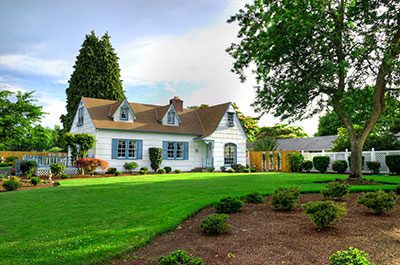
Who is responsible for that tree?

Lately, I have seen a number of downed trees. In one of those storms, one of your oak trees near the property line went down. The tree fell towards the neighbor, took out a fence near the property line and landed on your neighbors’ roof, damaging it. Only a few feet of this tree landed on your property. What do you do and for what are you responsible?
Both you and your neighbor may think that you are responsible for the cleanup of the tree because it was your tree. However, unless you are negligent in some fashion, you are not responsible for the damage caused to your neighbors’ property. For example, if the tree had been rotting for years, you knew about it and you were meaning to cut it down but didn’t, then you might be responsible for the damage. However, in most cases, since this is an act of God, you are not responsible for damage to your neighbors’ property.
Each property owner is responsible for repairs and clean up of their own property. In the example of the oak tree above, your responsibility and financial obligation ends at the property line. You are responsible for repairs to any damage and clean up the downed tree only on your property. You would contact your homeowners insurance carrier and work with their adjuster for the repairs and clean up.
A tree cutter would be hired and generally would cut and remove all of the tree materials on your property up to the property line. Your neighbors would be responsible for the repairs to their home and for removing the tree from their property. They would have to contact their homeowners insurance carrier for the repairs and clean up of their property.
You are not responsible for the repairs and clean up of your neighbors’ property, even if it was your tree. Your neighbors’ insurance company may send you a nastygram demanding you reimburse them for the costs of the neighbors’ repairs and cleanup. Do not pay them. In almost all instances, you are not legally responsible for your neighbors’ repair and clean up.
The insurance company usually threatens legal action if you do not pay. If you didn’t know otherwise, you would believe that you are responsible for the costs of your neighbors’ repair and clean up. But, typically you are not liable.
But what if the tree took out a fence? Who is responsible then? The typical lawyer answer is: “It depends.” It depends upon whose property the fence is located. For example, if the fence is on your property, the problem is yours. But you are not necessarily obligated to replace the fence. You generally have the choices of putting the fence back up or not, or even removing it altogether. It’s your fence. You can do what you want.
If the fence is on your neighbors’ property, your neighbor and their insurance company also have the choice of replacing the fence, or not. But, what if you do not know who is the owner of the fence because the fence has been up for years long before both you and the neighbors moved in. To avoid any neighborly disputes, you should hire a surveyor to mark the property line to determine upon whose property the fence is located and proceed accordingly.
Quite often, the fence is right on the property line. In such cases, both you and your neighbor may claim it is the other’s fence and want the other to fix it. If your neighbor claims it is not theirs, you have some options. You can fix the fence or not, or remove it. Or you could just tell your neighbor that you really don’t want to spend the money to fix the fence and you just want to remove it. This oftentimes triggers the neighbor who wants a fence to be a little more cooperative and may offer to share in the costs of repair.
And if the fence is your fence, be aware of your local ordinances. Most municipalities have a fence ordinance as part of their zoning ordinance. Every fence ordinance that I have reviewed requires that if you are putting up a fence it has to be placed entirely on your property and if it has a good side and a bad side, the good side has to go towards your neighbors.
For example, if you are putting up a brick-faced cinder block wall along the property line, the bricks must be on your neighbors’ side and the cinder blocks on your side. If you do not want to do that, then face both sides of the wall with bricks so that the good side is on both sides.
So next time your neighbors’ tree falls on your house after a storm, don’t be so quick to blame them or to request that they do the cleanup. They may not be responsible. Do your homework. Check with your insurance company. They should be able to assist you in this matter. And you could save yourself some unnecessary expenses.
Source: The Times Herald – Matthew M. Wallace is an attorney and CPA with the Wallace Law Firm, PC in Port Huron and can be reached at 810-985-4320, [email protected] or www.happylaw.com
Categories: Blog
